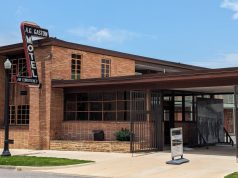 Insight to the Birmingham Water Works’ Operations and Technical Services Division
Insight to the Birmingham Water Works’ Operations and Technical Services Division
by Jessica Jones
Guaranteeing customers clean water is a promise the Birmingham Water Works Board strives to uphold. In order to fulfill that promise, the system must have an organized and thorough process by which water is gathered and treated. This is where the Operational and Technical Services Division comes in. This division consists of five departments: Water Resources (Raw Water), Water Treatment, Supervisory Control and Data Acquisition (SCADA), EnviroLab / Water Quality, and Security. These departments are responsible for various duties, all of which are connected to providing the best water to consumers.
The Water Resources Department is responsible for pumping raw (untreated) water to industrial consumers and water treatment plants from pumping stations such as Inland Lake, Lake Purdy, Cahaba Pump Station, Inland Pump Station, Sipsey Pump Station, Cane Creek Pump Station, Mulberry Pump Station, Mulberry Booster Station, and Alabama Street Booster Station.
Water treatment, an essential component of the system, is a systematic process. Once the water is pumped from a station, it is then treated. There are four treatment plants in the department, which include Shades Mountain Filter Plant, Western Filter Plant, Putnam Filter Plant and Carson Filter Plant.
According to Darryl Jones, the Assistant General Manager of Operations and Technical Services, in order for the utility to insure proper water filtration and purification, the water is mixed with a chemical mixing of coagulation chemicals. The host of chemicals includes lime to control the water’s pH level, flocculation, sedimentation, and filtration through multi-media filters, fluoride addition, and chlorine for disinfection.
“The operation of each of these stages of the water treatment process improves the water quality until the water is finally pumped to customers throughout the distribution system,” Jones said.
The BWWB relies heavily on their SCADA Department for the delivery of water to customers. This department works with the Engineering and Maintenance Department for the installation and upkeep of the equipment that runs the system. The distributed control system controls the treatment plants and raw water stations, where 140 remote sites manage each station and plant through a wireless private network.
“The remote sites can be water tanks, pump stations, pressure reducing valve stations, metering sites, and control valve locations,” said Jones.
To ensure that the water produced is of the highest quality, BWWB tests its water in the EnviroLab using the best technology available.
“The EnviroLab can perform tests using some of the most sophisticated technology you can find in any environmental lab,” he said. “Gas Chromatography, Mass Spectroscopy, Atomic Absorption and High Pressure Liquid Chromatography instruments are used daily by the chemists and scientists.”
The department conducts bacteriological testing required by the United States Environmental Protection Agency and Alabama Department of Environmental Management. Additionally, employees work with consumers to address water discoloration issues and maintain flushing units.
“We take pride in being known for the quality of our water, but we rejoice in being known for the quality of our service too,” said Jones.
“Our Water Quality Department maintains approximately 90 different automatic flushing units and dozens of flush points located all across the system, which maintains adequate chlorine levels in the drinking water and reduces disinfection by-products.”
In addition to providing top-quality water and services, the company also has one of the best security systems in the nation. For the last two years the system received high rankings by Security Magazine in the same category as power, nuclear, oil, and gas utilities.
“The security of our treatment facilities and various structures throughout the distribution system is critical to make sure that the health and well-being of the public here in Birmingham is protected,” said Jones. “All of this is a result of installing technology where appropriate and maintaining trained and skilled staff around the clock to protect our most precious resources, the people and the water that we provide.”



